Key takeaways:
- Workshop fatigue can stem from information overload, uncomfortable environments, and social dynamics, impacting engagement and learning.
- Taking regular breaks, practicing mindful breathing, and setting personal session limits can help manage fatigue and maintain focus.
- Active participation, such as asking questions and using creative note-taking methods, enhances engagement and retention during workshops.
- Building connections with peers during breaks stimulates fresh insights and reinforces learning, transforming the workshop experience.
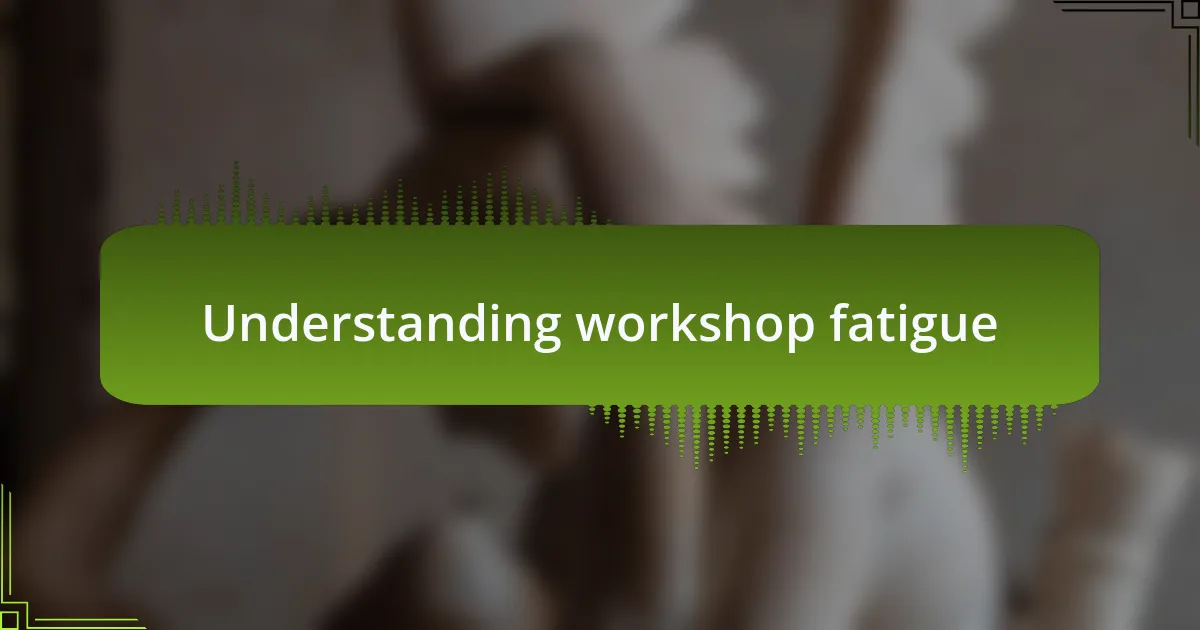
Understanding workshop fatigue
Workshop fatigue is a common yet often overlooked experience many attendees face, and I certainly felt its weight during my first major event. After hours of sitting, listening, and taking notes, I found myself struggling to stay engaged. Have you ever felt that moment when your mind drifts away, and the speaker’s words start to blur together? It’s a sign that your brain is overloaded.
As workshops pile up, the sheer volume of information can lead to mental exhaustion. I recall one particular expo where, by the third session, I felt my energy waning and questions began to swirl in my mind: How can I absorb all this knowledge? Am I truly learning anything valuable? This fatigue is a natural response, as our brains have limits on processing new information efficiently.
Acknowledging workshop fatigue is crucial for both organizers and participants. I realized that during these longer events, taking purposeful breaks and engaging in conversations with fellow attendees recharged my enthusiasm. How often do we overlook the simple power of stepping away for a moment to reconnect with ourselves and others? Recognizing this need for a balance can transform our workshop experiences from overwhelming to enlightening.
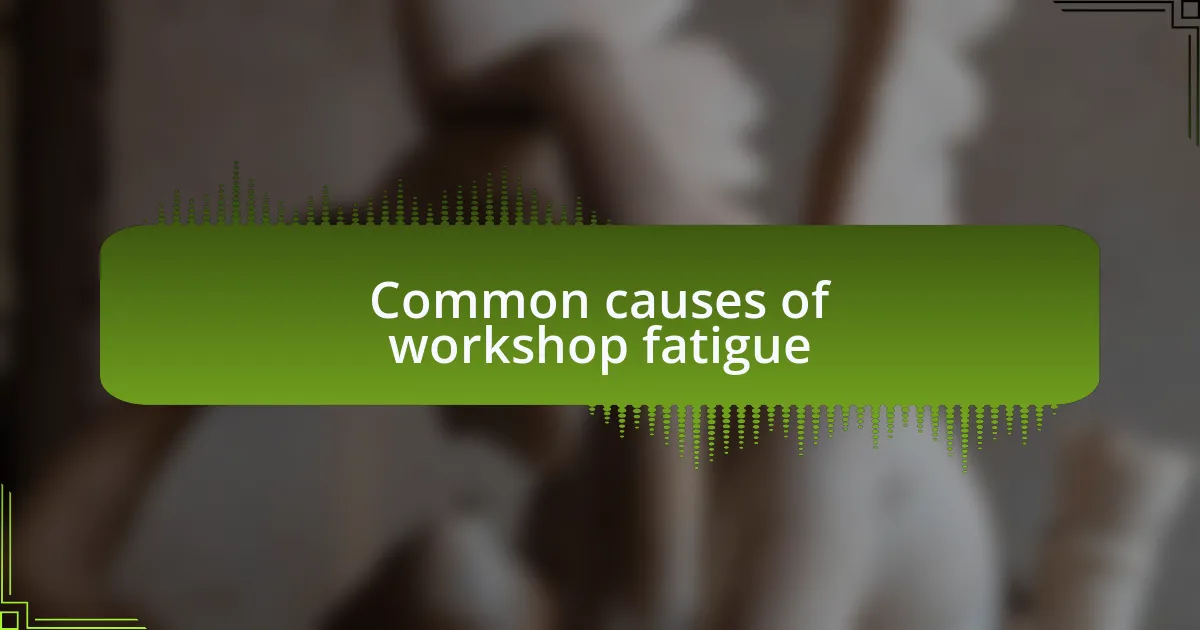
Common causes of workshop fatigue
One common cause of workshop fatigue is the overwhelming amount of information presented in a short time. I remember attending a day-long seminar that packed in session after session without a break. By the end, I was left feeling mentally drained and unable to retain much of what I had learned. Has anyone else found themselves in that position, where the too-quick pace just numbs your brain instead of igniting it?
Another factor at play is the environment in which workshops are held. Poor lighting and uncomfortable seating can sap your energy even before the sessions begin. I once sat on a hard chair in a dimly lit room, and I felt my focus slip away with each passing minute. It made me wonder, how can we expect to absorb knowledge when our physical comfort is compromised?
Moreover, the social dynamics in workshops can contribute significantly to fatigue. I used to feel pressure to network extensively, which, while crucial, often left me feeling drained after engaging conversations. It begs the question: how do we strike a balance between meaningful interactions and our need for downtime? Recognizing this can help us navigate our energy levels better during these extensive events.
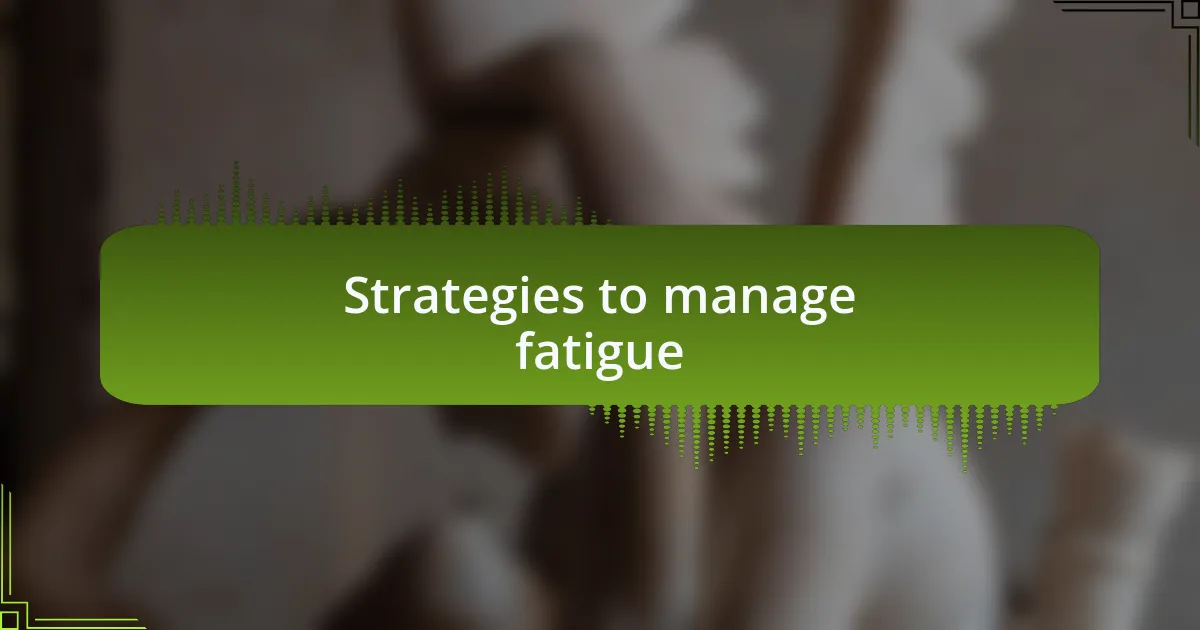
Strategies to manage fatigue
During workshops, one effective strategy I’ve adopted is setting personal time limits for each session. I often find myself zoning out after the first hour, so I’ll step outside or take a brief walk to reset. This simple act not only fuels my energy levels but also allows me to process the information more effectively—have you ever noticed how a quick change of scenery can clear your mind?
In addition to taking breaks, I also make it a point to engage in brief, mindful breathing exercises throughout the day. On one occasion, I felt a wave of fatigue coming on during a particularly long session, so I closed my eyes for just a minute and focused on my breath. The result? I emerged feeling rejuvenated and ready to absorb more knowledge. Have you ever tried just pausing and reconnecting with your breath? It can make a world of difference.
Finally, I’ve learned to prioritize my social interactions during workshops. Instead of attempting to connect with everyone, I choose a few individuals for deeper conversations. This way, I can forge meaningful relationships without feeling completely drained by the end of the day. It’s all about quality over quantity. How do you approach networking? Embracing a more selective approach has been a game-changer for me.
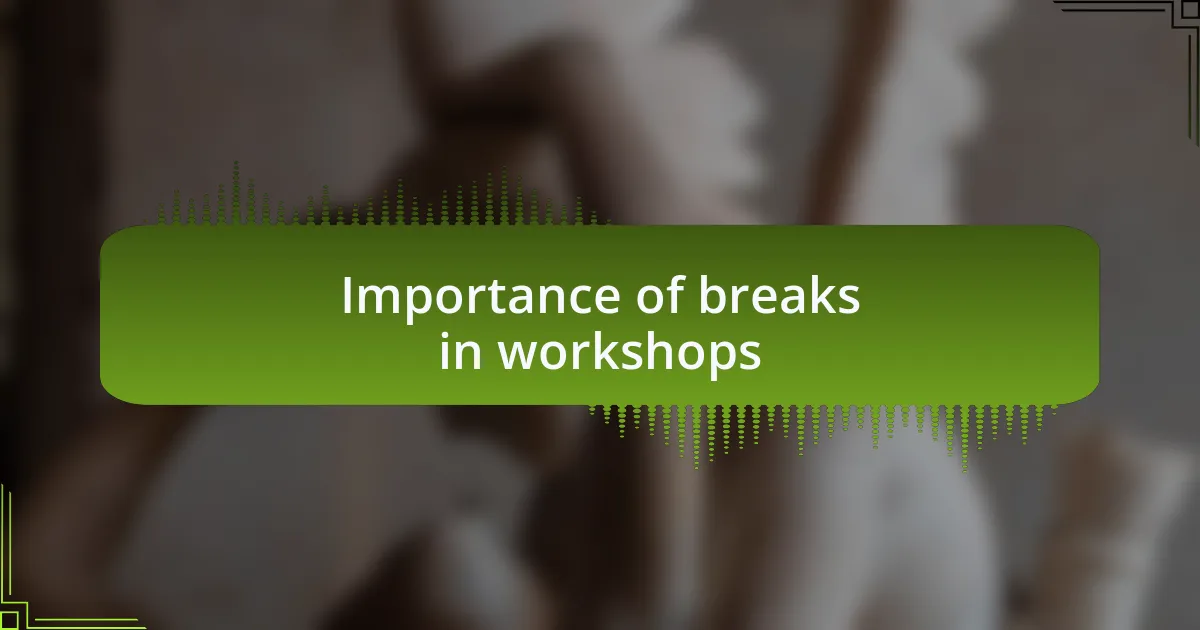
Importance of breaks in workshops
Taking breaks during workshops is essential for maintaining energy and focus. I’ve noticed that without interruptions, my ability to engage diminishes significantly. For example, there was a time I pushed through a full afternoon session without stepping away. By the end, I felt mentally exhausted and unable to retain any of the material. Have you ever felt like you’re listening but not truly absorbing what’s being presented?
Incorporating short breaks not only recharges my mind but also fosters creativity. I remember a moment when I stepped outside during a lunch break and stumbled upon an interesting conversation with a fellow attendee. That brief interaction sparked new ideas that enhanced my understanding of the workshop topics. It made me realize that even a simple change of pace can lead to invaluable insights—what surprising connections might you discover during your next break?
Moreover, breaks serve as a chance to reflect on what’s been learned. After I return from a quick stroll, I take a moment to jot down key points or thoughts that emerged. This practice keeps the information fresh and encourages deeper comprehension. Have you found that reflecting post-break enhances your ability to connect the dots? Taking those moments to pause and think can truly transform how we process and retain information.
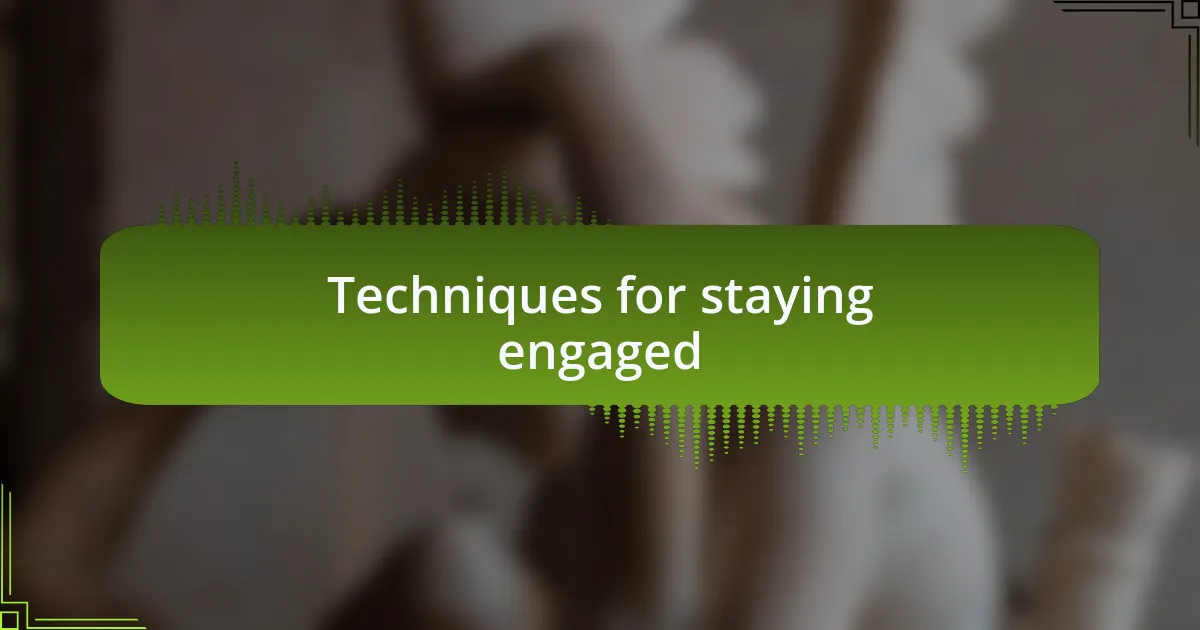
Techniques for staying engaged
Staying engaged during a workshop often hinges on active participation. I’ve found that asking questions can be a game-changer. Recently, during a session on audiovisual technology, I raised my hand to clarify a point and ended up igniting a lively discussion. How often do you seize the chance to voice your curiosity? Engaging with the material honestly fosters a sense of connection, not just with the content but also with the presenters and fellow attendees.
Another technique that I’ve embraced is switching up my note-taking style. Instead of jotting down every word, I started using mind maps. This visually stimulating approach allows me to see relationships between topics at a glance, which really helps my retention. Have you ever tried mapping out ideas instead of writing them linearly? It offers a refreshing break from the monotonous scrawl and transforms the way I interact with the material—it feels like art and learning combined!
Lastly, I’ve discovered the value of collaborative discussions in breakout sessions. These small group interactions energize me and provide opportunities to dive deeper into subjects. During a recent workshop, we split into groups, and someone shared a real-world experience that perfectly illustrated a theoretical concept. It made learning feel less like a chore and more like an exchange of valuable insights. Don’t you find that learning with others can sometimes unlock new perspectives you hadn’t considered before? Embracing this collaborative spirit can truly enrich the workshop experience.
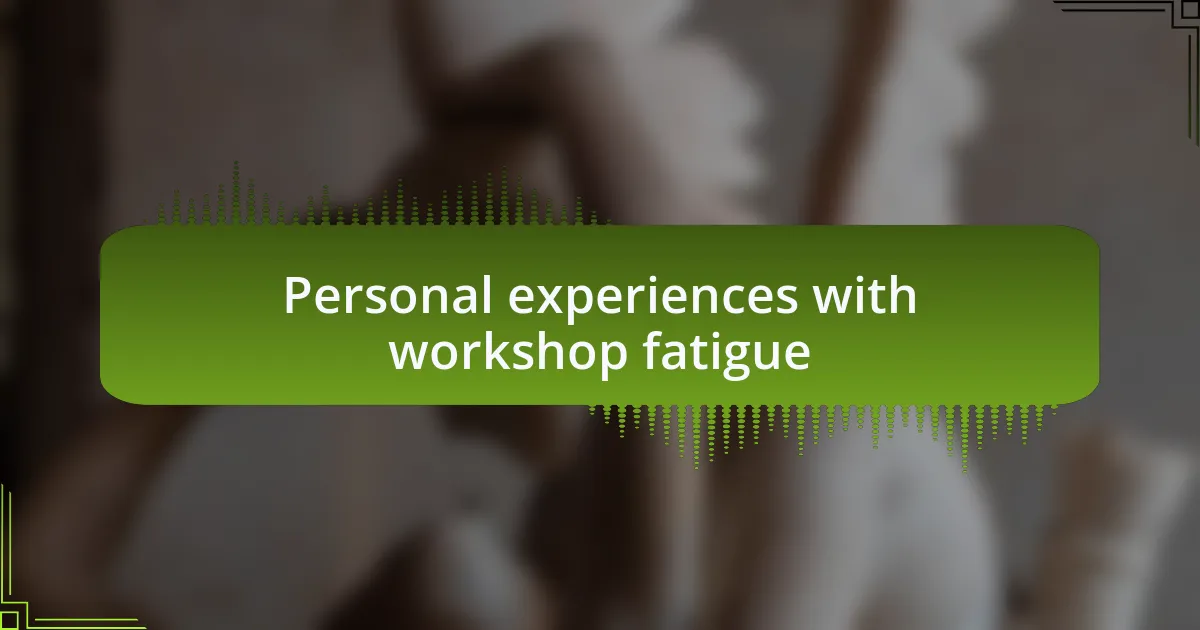
Personal experiences with workshop fatigue
After attending a series of intensive workshops, I began to notice a creeping fatigue that dulled my enthusiasm. I remember one particular workshop on sound design where, despite my initial excitement, I found myself zoning out halfway through. It’s frustrating when important information slips away simply because my focus has waned. Have you felt that same struggle during long sessions? I think everyone has moments when they battle to keep their eyes open.
One time, I hit a wall during a marathon session on lighting techniques. The presenter was knowledgeable, yet my mind felt heavy with information overload. I realized that taking short breaks to step outside and breathe fresh air helped refresh my perspective. Isn’t it fascinating how a change of scenery can rejuvenate our focus? I often found myself returning with a clearer mind and renewed energy, ready to dive back into the material.
I also recall an instance where I nearly missed a crucial hands-on activity due to workshop fatigue. That day, I let fatigue get the better of me and almost skipped what turned out to be the most engaging part of the workshop. It made me realize just how important it is to manage energy levels proactively. Have you ever had a near-miss that made you rethink your approach? This experience taught me that putting in the effort to stay present, even when tired, can lead to those lightbulb moments that make workshops truly worthwhile.
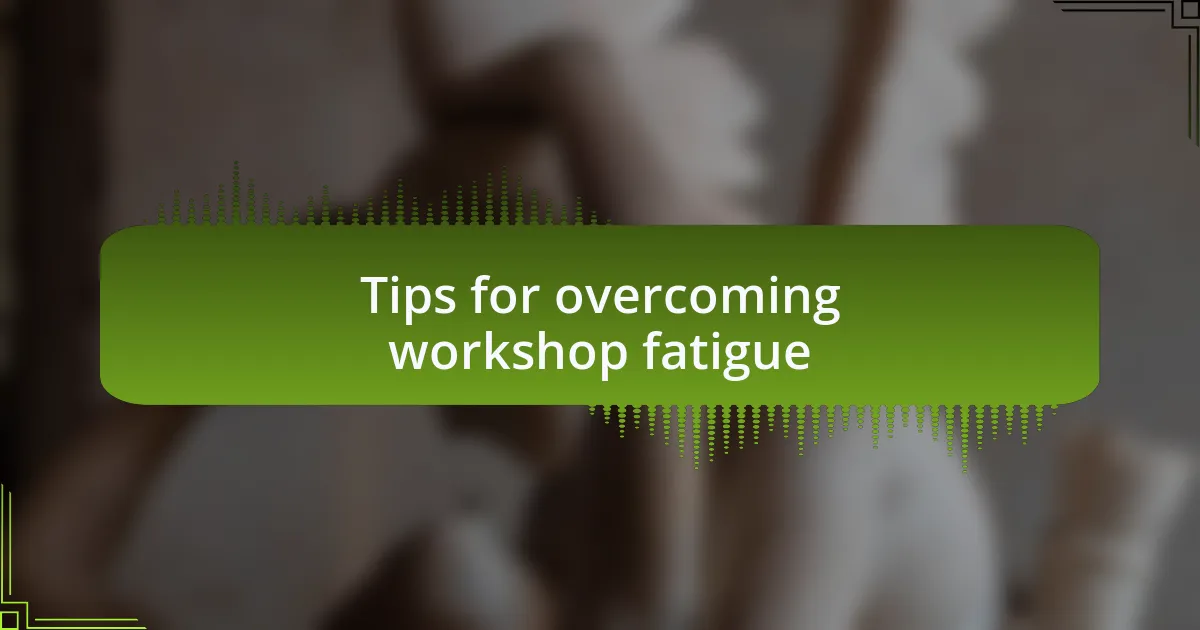
Tips for overcoming workshop fatigue
Finding ways to overcome workshop fatigue is essential for fully absorbing valuable insights. One effective strategy I adopted was the “5-10-15 rule”: Every hour, I take five minutes to stretch, ten minutes to sip water, and fifteen minutes to reflect on what I’ve learned. It sounds simple, but this routine has consistently helped me recharge and maintain focus, allowing me to engage more deeply with the content. Have you ever considered how small adjustments can yield significant results?
Another approach that worked wonders for me involved connecting with fellow participants. During breaks, I often struck up conversations with peers about their takeaways from the sessions. Not only did this exchange strengthen my engagement, but it also reinforced what I was learning. It’s remarkable how discussing concepts with others can spark fresh insights and keep you excited about the material, isn’t it? I’ve found that when we share our thoughts, the fatigue seems to fade a little.
Lastly, I discovered that incorporating a bit of movement during breaks made a big difference. A quick walk around the venue or some light stretching helped wake me up and broke the monotony of sitting. I vividly remember one workshop where I led a small group in some light exercises. The laughter and energy we shared reinvigorated the room, making the next session much more enjoyable. Have you ever tried to energize yourself with movement? It’s a small step that can transform the workshop experience into something much more dynamic.